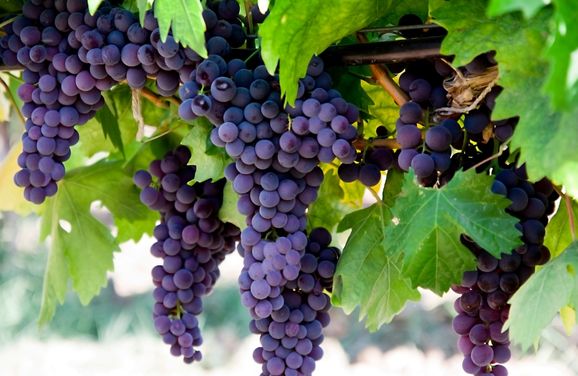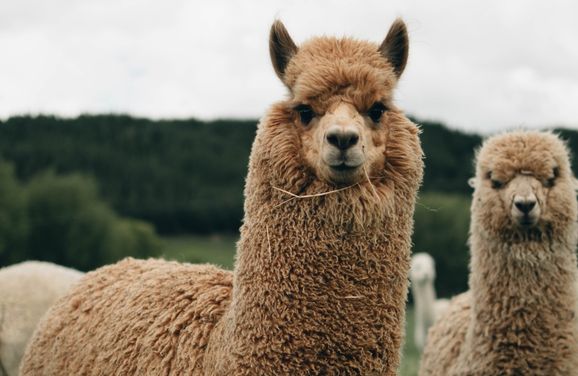When it comes to feeding our adorable alpacas, it’s essential to be aware of the safe foods they can consume and which ones should be avoided.
One particular food that may appear harmless but can actually be dangerous to alpacas is grapes.
Alpacas should not eat grapes. This fruit contains a toxic substance which is persin. Ingesting this substance can cause alpacas’ digestive issues such as diarrhea, abdominal pain, and in some extreme cases, kidney failure.
In this blog post, we will discover the dangers of feeding alpacas grapes, the symptoms of persin toxication, and how to prevent this potential risk.
Grapes for alpacas: can these cuddly friends enjoy this tasty treat?
The short answer is no.

It is not recommended to feed alpacas grapes because this fruit can cause digestive issues to your fluffy animal.
Grapes, including raisins, have a toxic substance called persin in their composition.
This element, “persin” can cause severe health damage like kidney failure in alpacas and other animals.
Persin is found in all the parts of the grapes, for instance, the leaves, and the stems.
So, all the parts of the grape plants should be avoided and not given as a treat for your alpaca.
Another critical thing to know is that “persin” is not exclusively found in wild grapes.
This toxic substance to alpacas is also found in regular grapes that we find in gardens.
Taking into consideration that grapes are not recommended as a treat for alpacas, it is essential to keep this fruit away from their diet.
Because even a few grapes (grape plants or products that have this fruit in their composition) can potentially create digestive issues for your fluffy companion.
What are the potential risks of feeding alpacas grapes?
The potential risks of feeding alpacas grapes include persin toxicity, which can cause, in severe cases, kidney failure.
Here are the key symptoms that may occur if alpacas consume grapes:
The signs of persin toxication vary between vomiting, diarrhea, dehydration, abdominal pain, and difficulty breathing.
In extreme cases, it can escalate to kidney failure, which can be pretty hard to endure for your alpaca.

Knowing the curious nature of our fluffy pals and their tendency to want to discover new things, they may try to eat grapes if they come across them.
So, always pay attention to keeping your alpacas away from places where they can directly reach grapes.
What to do when you find out that your alpacas consumed grapes?
Suppose you suspect that your alpacas have consumed grapes.
In that case, it is vital to take quick action to stop further ingestion and to seek veterinary supervision.
Here are some steps you can take in this case:
1. First, remove all grapes from the alpacas’ environment
The primary thing to do is remove all grapes from where you keep your alpacas.
This also includes products that contain elements of grapes, such as supplements.
If you have a grape vineyard, it is best to change the location of your fluffy pal away from this area.
2. Watch the behavior of your alpaca
If you find out that your alpaca consumed grapes, it is critical to monitor the following symptoms of persin toxicity:
These may include vomiting, diarrhea, dehydration, abdominal pain, and difficulty breathing.
If you notice any of these symptoms, then it is a clear indication to contact your veterinarian immediately.
3. What can you do while waiting for the veterinarian?
The primary care you can provide to your alpaca is to give it fresh water to help stop dehydration.
This will also help flush out toxins and make their recovery smoother.
4. Consulting with your veterinarian is the best course of treatment.
After providing your furry animal water as a primary act of help, consulting a veterinarian is considered a necessity.
Veterinarian diagnosis will determine if the alpaca requires an urgent intervention or if its case is mild.
So, relying on the severity of the case, your veterinarian may suggest blood work, as well as urine analysis and other diagnostic examinations to assess the kidney function and the alpaca’s overall health.
Depending on the severity of the case and how much and long your alpaca consumed grapes, the veterinarian may suggest a treatment plan that could contain medications to help lower inflammation and prevent kidney failure.
5. After the treatment
Treating the alpaca is not enough; keeping an eye on its recovery journey afterward is highly advised.
So, keep monitoring the behavior and how well your alpaca is recovering for the following weeks.
Always remember that immediate intervention after discovering that your alpaca consumes grapes is the right thing to do.
Because the earlier you treat your animal, the better the recovery will be, and the chance of getting severe outcomes will lower.
Therefore, seeking veterinary care as soon as possible is crucial for your alpaca’s well-being and healing.
Related questions about this topic
Do alpacas eat grape vines?
Alpacas can eat grape vines, but only if other food sources, such as grass, hay, or other vegetation, are scarce.
So, their herbivore nature allows them to consume this food in critical conditions when the typical elements of their diet are not widely available.
Yet, it is not advised to feed alpacas grapes vines in large quantities or introduce them as a staple in their diet.
Excessing grapes vines consumption may cause alpacas to experience digestive problems that can be quite serious.
Plus, consulting the professional view of a veterinarian or an experience alpacas raiser is highly recommended to ensure that these furry pals’ diet is healthy and well-balanced.
What about baby alpacas? Can they eat grapes?
It is not advised to feed baby alpacas grapes.
Baby alpacas or crias require a well-balanced diet of grass, hay, and other specific nutrients that boost their growth and promote healthy development.
A simple and essential diet mainly based on hay and fresh water will ensure that baby alpacas thrive.
Can alpacas eat grapes seeds? Is it safe?
Alpacas can not eat grapes seed because they contain substances such as cyanogenic glycosides and tannins that can be toxic for them and may cause stomach upset.
Plus, seeds are tricky to ingest, which can cause a choking hazard for our furry buddies.
Conclusion

While grapes look really fun, a harmless treat for alpacas to eat, they can actually cause serious health issues for your fluffy friend.
It is not recommended to feed alpacas grapes because this fruit contains a toxic substance, persin, that can harm your animal’s health.
Another risk is that the nature of grapes and their seeds can cause a choking hazard for your animal.
Related Post
There are other delicious and safe treats to give your alpaca.
Here are 3 nutritious and fun foods you can give your alpacas occasionally that do not cause any health issues if fed moderately.
Leave a Reply